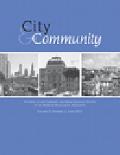
Using data generated from participant observation and semistructured interviews, I consider the ways in which nightlife, or what might be imagined as the nightly round—a process encompassing the social interactions, behaviors, and actions involved in going to, being in, and leaving the club—is used to mitigate the effects of social and spatial isolation, complementing the accomplishment of the daily round. Through an analysis of the social world of The Spot, I argue that understanding the ways in which urban blacks use space in the nightclub to mediate racial segregation, sexual segregation, and limited social capital expands our current understanding of the spatial mobility of urban blacks as well as the important role of extra-neighborhood spaces in such processes. Further, I highlight the ways that urban blacks use space in the nightclub to leverage socioeconomic opportunities and enhance social networks. While I found that black heterosexual and lesbian and gay patrons used space in similar ways at The Spot, black lesbians and gays were more likely to use the club as a space to develop ties of social support.